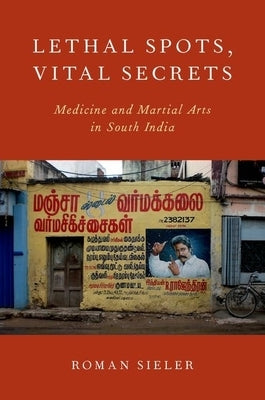1
/
of
1
Oxford University Press, USA
Lethal Spots, Vital Secrets: Medicine and Martial Arts in South India
Lethal Spots, Vital Secrets: Medicine and Martial Arts in South India
Regular price
€44,95 EUR
Regular price
Sale price
€44,95 EUR
Shipping calculated at checkout.
Quantity
Couldn't load pickup availability
Lethal Spots, Vital Secrets provides an ethnographic study of varmakkalai, or the art of the vital spots, a South Indian esoteric tradition that combines medical practice and martial arts. Although siddha medicine is officially part of the Indian Government's medically pluralistic
health-care system, very little of a reliable nature has been written about it. Drawing on a diverse array of materials, including Tamil manuscripts, interviews with practitioners, and his own personal experience as an apprentice, Sieler traces the practices of varmakkalai both in different religious traditions--such as Yoga and Ayurveda--and within various combat practices.
His argument is based on in-depth ethnographic research in the southernmost region of India, where hereditary medico-martial practitioners learn their occupation from relatives or skilled gurus through an esoteric, spiritual education system. Rituals of secrecy and apprenticeship in varmakkalai are
among the important focal points of Sieler's study. Practitioners protect their esoteric knowledge, but they also engage in a kind of lure and withdrawal---a performance of secrecy---because secrecy functions as what might be called symbolic capital. Sieler argues that varmakkalai is, above all,
a matter of texts in practice; knowledge transmission between teacher and student conveys tacit, non-verbal knowledge, and constitutes a moral economy. It is not merely plain facts that are communicated, but also moral obligations, ethical conduct and tacit, bodily knowledge. Lethal Spots, Vital Secrets is an insightful analysis of practices rarely discussed in scholarly circles. It will be a valuable resource to students of religion, medical anthropologists, historians of medicine, Indologists, and martial arts and performance studies.
Author: Roman Sieler
Publisher: Oxford University Press, USA
Published: 06/01/2015
Pages: 320
Binding Type: Paperback
Weight: 1.00lbs
Size: 9.10h x 6.00w x 0.90d
ISBN: 9780190243869
Review Citation(s):
Choice 12/01/2015
health-care system, very little of a reliable nature has been written about it. Drawing on a diverse array of materials, including Tamil manuscripts, interviews with practitioners, and his own personal experience as an apprentice, Sieler traces the practices of varmakkalai both in different religious traditions--such as Yoga and Ayurveda--and within various combat practices.
His argument is based on in-depth ethnographic research in the southernmost region of India, where hereditary medico-martial practitioners learn their occupation from relatives or skilled gurus through an esoteric, spiritual education system. Rituals of secrecy and apprenticeship in varmakkalai are
among the important focal points of Sieler's study. Practitioners protect their esoteric knowledge, but they also engage in a kind of lure and withdrawal---a performance of secrecy---because secrecy functions as what might be called symbolic capital. Sieler argues that varmakkalai is, above all,
a matter of texts in practice; knowledge transmission between teacher and student conveys tacit, non-verbal knowledge, and constitutes a moral economy. It is not merely plain facts that are communicated, but also moral obligations, ethical conduct and tacit, bodily knowledge. Lethal Spots, Vital Secrets is an insightful analysis of practices rarely discussed in scholarly circles. It will be a valuable resource to students of religion, medical anthropologists, historians of medicine, Indologists, and martial arts and performance studies.
Author: Roman Sieler
Publisher: Oxford University Press, USA
Published: 06/01/2015
Pages: 320
Binding Type: Paperback
Weight: 1.00lbs
Size: 9.10h x 6.00w x 0.90d
ISBN: 9780190243869
Review Citation(s):
Choice 12/01/2015
About the Author
Roman Sieler has a PhD in cultural anthropology from South Asia Institute, Heidelberg University (2011). His research interests include siddha medicine and the transmission and practice of non-institutionalized forms of health care in India, especially bonesetting and other forms of manual medicine. Currently, Sieler is Assistant Professor of anthropology at the South Asia Institute, where he coordinates the MA program Health and Society in South Asia. He is also an affiliate postdoctoral researcher at the French Institute of Pondicherry, India.
Share


